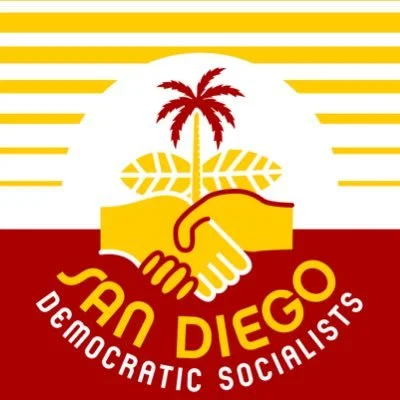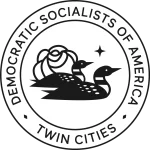

The time for fence-sitting, apolitical unionism must come to an end.
Note: posts by individual GMDSA members do not necessarily reflect the views of the broader membership or of its leadership and should not be regarded as official statements by the chapter.
Below is a speech made by Green Mountain DSA labor chair, Andy Blanchet, on June 10th, 2025 at the Burlington, VT ICE OUT protest. The protest brought together people across the Vermont community - from union & migrant workers to retirees and community organizers - to stand in solidarity with the community of Los Angeles, CA in their resistance to government repression.
GMDSA’s Labor Committee recently worked with rank and file union members in putting on a Union Power organizing training in April 2024, and was a key organization in coordinating and organizing the May Day 2025 March in Williston, VT where 2,500 people came out to celebrate international workers’ day and stand in solidarity with Vermont migrant farm workers in their Milk with Dignity picket line at Hannaford Supermarket.
Repeat after me: An Injury to One, is an Injury to all! (x3)
Hello! My name is Andy Blanchet and I am a full-time worker at Howard Center, and speak today as president of our labor union, AFSCME Local 1674, and as chair of the Green Mountain Democratic Socialists of America Chapter’s Labor Committee. I come with an urgent message for fellow working class people and our role in combating Trump’s Authoritarian cruelty as witnessed in LA and beyond. I first want to state clearly: AFSCME Local 1674 stands in solidarity with all who have been kidnapped by ICE and DHS and we demand the immediate release of those currently detained. We stand in solidarity with every Union member on the streets exercising our right to freedom of speech in calling for an end to the cruel ICE raids. These unacceptable state sponsored acts of kidnapping are both horrific and unsurprising from this administration. Unsurprising, considering capitalism’s fundamentally authoritarian nature.
We currently live in a world where bosses who run corporations have full authority over workers. This is an ugly dictatorship of capital - where those who make profits from the blood, sweat, and tears of workers can decide exactly what kind of lives we are allowed to live by exploiting our time and energy for the sake of profit. Not only that, but the capitalist landlords, who pay for their new pools and 2nd homes with our meager wages we break our backs for, decide exactly how much to extort from us in exchange for shelter. Workers have historically worked to combat this dictatorship of the bosses by forming our own labor and tenant unions.
And with that collective organizing, working class people have tried to exercise our natural rights to free speech, organizing, freedom of association, and collective bargaining to win both better wages and working conditions, as well as political change. However, every step of the way, the rich have fought us tooth and nail for even the most meager of wins. They hire union busting lawyers from an industry that reaps profits by convincing employers to keep them on retainer in order to fight their own workers simply pursuing dignity and respect in the workplace. They call the police on striking workers, like they did to Starbucks Workers’ United members during their sit-down strike earlier this year. The rich have even gone so far as to OUTLAW the ability to strike, to withhold our labor, in different industries. That didn’t stop unions like the Newton Teachers’ Association of Newton Massachusetts from organizing a successful, and illegal, strike to win their demands.
But now, it seems, the rich bosses want more. They criminalize working people from speaking out in support of Palestine through the critique of our own country’s complicity in the ethnic cleansing and genocide of the Palestinian people. ICE beat & detained the President of SEIU California, David Huerta, while he exercised his freedom of speech. The rich are willing to target unions, union workers & leaders, and immigrant workers to maintain their full control over our economic, political, and social lives. And it is essential that every union, be they local or international, answer the question: Which side are you on?
The time for fence-sitting apolitical unionism must come to an end. There are numerous examples of unions trying to play-nice with overtly hostile political administrations, thinking this would save them, and it never has. All this does is allow those in power to exercise their will over organized labor and know they can get away with it. Worse than that, the do-nothing Democratic party has used the plight of working class people as their political platform for decades. Workers are not pawns to be used in rhetoric and then discarded when it’s time to make good on policy promises - working people are who have built and sustained society and we deserve money for healthcare, prenatal & child care, education, housing, and food, not money for bombs and deportation! It is well past time for unions, big and small, to recognize these trends and organize to win the future we all deserve.
We can win these demands, and more, if we recognize and internalize that when we are divided, and alone, we are at risk. But when we practice safety through solidarity, we are unstoppable! Look at what organized labor did to energize the working class of South Korea in 2024. By organizing workers in huge companies into strike-ready unions and collaborating with farm workers, Korean workers were able to mobilize and fight back against President Yoon Suk Yeol’s declaration of martial law in a fight for democracy. We, the workers and organized labor, must find the political will to commit to this version of organizing for the common good in order to have a lasting impact. We deserve lives of dignity, honor, love, and justice!
The workers, united, will never be defeated! (x3)
Thank you! Solidarity Forever!


Statement on ICE and Deportations
Columbus DSA condemns, in the strongest possible terms, the actions of President Trump and his administration, the United States armed forces, ICE, and the LAPD in their relentless brutality against peaceful protestors fighting to protect their communities from the thugs abducting their friends, family, and neighbors. We condemn the violence of ICE and their campaign of mass deportations that has come to our city of Columbus. On June 3rd ICE arrested Leonardo Fausto at a court hearing for a dismissed misdemeanor traffic violation. Fausto has lived in Columbus legally for 4 years while waiting to be granted asylum. Ohio senators have also passed a bill that will require public officials to allow the arrest of suspected undocumented immigrants with or without warrants, while other Ohio lawmakers have proposed the “America First Act”, making it a felony to be in Ohio undocumented. We stand in unshakable solidarity with our undocumented neighbors: no one’s existence is illegal.
The recent protests in Los Angeles and other cities demonstrate that the American people are aware of the cruelty that this administration inflicts upon our families, our neighbors, and people in our communities, and we demand that these abuses stop.
Left unchecked, this administration, alongside ICE and local law enforcement, will continue to hide what the ‘land of the free’ has become from the world. They obscure their names and faces so that no one knows who to hold accountable for their crimes, all while they vanish our neighbors, family, and friends. ICE has only existed since 2003 but is being used like the Gestapo of Nazi Germany to create terror among us. We have lived without their presence for most of our existence, and we don’t need them now. To that end, we demand the following from our own community of Columbus:
We demand ICE be abolished. We demand that undocumented citizens be given amnesty and a swift path to citizenship. And we call for the immediate release of every person that ICE has arrested in LA and across the nation.
We demand that Columbus City Council end their contracts with ICE, make Columbus a sanctuary city, and protect its residents from these illegal abductions.
Columbus DSA will continue to fight for the power of the working class and the freedoms of people all over the world, immigrants or not. We will not stand by as the people of our community are abused by state violence. An injury to one is an injury to all. Free the prisoners, abolish ICE, and end the authoritarian regime currently in power.


Migrant Rights Priority Campaign: Summer 2025 Update
As part of our 2025 Migrant Rights Campaign, DSA San Diego is pressuring Grossmont Union High School District to defend students against ICE raids. Read more. [...]
Read More... from Migrant Rights Priority Campaign: Summer 2025 Update
The post Migrant Rights Priority Campaign: Summer 2025 Update appeared first on Democratic Socialists of America | San Diego Chapter.


The Left Is Not Ready For Shifts In The Working Class – But Class Struggle Unionists Are

Your National Political Committee newsletter — Struggle and Joy
Enjoy your June National Political Committee (NPC) newsletter! Our NPC is an elected 18-person body (including two YDSA members who share a vote) which functions as the board of directors of DSA. This month, standing against ICE, celebrating Pride and Juneteenth, preparing for Convention, and more!
And to make sure you get our newsletters in your inbox, sign up here! Each one features action alerts, upcoming events, political education, and more.
- From the National Political Committee — Struggle and Joy
- RSVP for The Fight for a Socialist Green New Deal Call Wednesday 6/25!
- Monthly Convention Update — Secondary Amendment Submissions, Observer Registration, Volunteering at Convention, and More!
- Save the Date: DSA Fund’s A World To Win Fellowship Nominations Open Wednesday 6/18
- Fundraising Committee Membership Applications are Open!
- Send Chapter News to Democratic Left
- Socialist Forum 2025 Convention Special Issue — Call for Pitches
From the National Political Committee — Struggle and Joy
Things are scary out there. Here in the States, the Trump administration and their ICE jackboots are throwing union leaders in jail on ridiculous, inflated charges, raiding workplaces from coast to coast, ripping healthcare away from trans folks, and deploying the US military in our cities. Internationally, Israel continues to starve and massacre Palestinians and seems to be starting, with bottomless US financial support, a war with Iran. This Saturday, June 14, in Washington DC, Trump is hosting a $92 million military parade from the Pentagon to the White House for his birthday — a victory march meant to celebrate his agenda of war and destruction, rally far-right support, and project strength to the world, while massively wasting taxpayer dollars amid his government’s life-threatening cuts to basic social services.
But when the working class is under attack, what do we do? Stand up, fight back!
DSA unequivocally stands with our immigrant neighbors — and not just with words. Our members are holding strong with our communities from Los Angeles to Boston, from San Antonio to Seattle, and especially mobilizing with our labor unions in response. We will be out in numbers this weekend demanding the better, safer, kinder, more just world that we know is possible.
Against Trump’s militarized birthday parade on June 14, the people of Washington DC are choosing to reject fear, and instead will celebrate local culture, community, and connections to one another at #DCJoyDay.
In New York City, Zohran Mamdani’s democratic socialist campaign for mayor keeps surging in momentum, and is now within striking distance of the flagrantly corrupt frontrunner Andrew Cuomo, with just under two weeks to go until the primary election. The ruling class of the world’s wealthiest city is nervous — they don’t understand political success without their own big money strings attached. In a debate last night, Cuomo even said “we wonder who’s funding DSA?” The answer is you — and tens of thousands of working class members giving whatever we can in dues, to punch way above our weight together!
If you’re not sure where to start taking action, here are some steps you can take:
- join our Boycott Avelo campaign to hold the companies that collaborate with these fascist ICE deportations accountable
- join our campaigns to Boycott Chevron
- RSVP for our Labor vs ICE call Wednesday 6/18
- organize Labor for an Arms Embargo, to make it clear that we will not stand for genocide
Our class enemies know that all of these issues are connected; we must, too.
In the midst of the fear and uncertainty, we also remember that June is a month to revel in the joy of victory over fascist forces. Pride and Juneteenth celebrations are both steeped in that tradition: Pride started when trans and queer folks refused to let a fascist police force take away their community space and collective joy; Juneteenth celebrates the end of chattel slavery in the United States, and comes with a reminder that liberation is incomplete — none of us are free until we are all free.
We encourage you to let these celebrations help you remember the long game here. These fights are difficult, the enemies are terrifying and extremely well-equipped, but when we organize, when we use and expand our collective strength, when we stand in solidarity, then we are more powerful than anything the ruling class can throw at us, and the fight for socialism is a fight for a better world for everyone. There is light at the end of the tunnel; there is joy at the end of the struggle. Let that fuel you.
¡Hasta la Victoria!
Megan Romer and Ashik Siddique
DSA National Co-Chairs
P.S. We want to send a warm welcome to our newest DSA organizing committees: Upstate SC, Owensboro (KY), The Shoals (AL), and Pinal County (AZ); and a special shout-out to our newest full-fledged chapters: Rock River DSA (WI) and St. Cloud DSA (MN)!
RSVP for The Fight for a Socialist Green New Deal Call Wednesday 6/25!
Join Wednesday 6/25 at 8pm ET/7pm CT/6pm MT/5pm PT us to hear from union leaders, DSA campaign organizers, and socialists in office who are continuing the fight for a better future. Given the hostile federal terrain we now face, local pressure campaigns in our communities and bargaining for the common good in our union contracts are the most viable pathways for winning a socialist Green New Deal this decade.
Monthly Convention Update — Secondary Amendment Submissions, Observer Registration, Volunteering at Convention, and More!
Submit or sign on to an Amendment to an existing Resolution, Constitution/Bylaws Amendment, or Platform Amendment via our Convention Hub! Amendments to proposals are also processed through the Portal on our national Discussion Forum. The deadline for secondary amendments is Sunday 6/29. You can find more information on our proposals page here.
And Convention registration is now open! For Delegate and Alternate Registration, Delegation Chairs will receive registration information after their chapter’s election results have been submitted. The election results will be checked for any errors or expired memberships. Any issues found must be resolved before registration information is provided, and we will provide you with directions to resolve it. You can find registration information on the Convention website here. Early bird delegate registration is $175. The deadline for early bird registration is Sunday 6/22.
Observer registration is open as well. DSA members in good standing can attend the Convention in a non-voting capacity as an Observer. The Observer registration fee is $225.
Observers can view plenaries and deliberation on proposals and attend breakout sessions. Observers are not eligible for scholarship funding. For questions, please email DSACon@dsausa.org.
To make sure all delegates and alternates can fully participate, scholarships will be available through our Solidarity Fund. If a duly elected Delegate or Alternate needs assistance with registration fees, travel costs, housing, or food assistance they may apply for a scholarship. Please see your Delegation Chair for details. The scholarship deadline has been extended to Sunday 6/22. And as a socialist organization, we support each other! To help sponsor a comrade, you can give here.
This year’s Convention will be one of the largest member gatherings in DSA’s history. The check-in process, debate sessions, and our voting tools need to run smoothly for our 1,500+ attendees. If you are a DSA member in good standing who can provide support during the Convention, in any of these areas, please check out the shifts we have available at the form here!
Are you an artist, maker, creator, collector, or just a cool comrade with an even cooler item that you’d love to donate to a good cause? Please consider donating to our 2025 DSA Convention fundraiser live auction! The submission deadline is Monday 6/30. We’re looking for art pieces, handmade items, one-of-a-kind socialist collectibles, experiential gifts (a weekend stay at a vacation property, a dance lesson, concert tickets, a tattoo, perhaps?) or some funky or creative thing we haven’t even thought of! Funds raised will go directly to Convention costs, helping it stay affordable for working-class comrades from around the country.
And say hi to comrades in the Convention Solidarity Journal! This year’s National Convention will feature a printed Solidarity Journal that will be distributed to all Convention attendees and shared online. You, your chapter, working group, or committee can place an ad in the Solidarity Journal to send a message of solidarity or of celebration to your chapter, work, or comrades. The deadline to purchase an ad is Friday 7/18.
Please note that Solidarity Journal messages advocating for or against any convention proposal, NPC candidate, slate, or DSA caucus will not be accepted. Journal space is available in three sizes, plus text-only solidarity messages. Ads should be sent as PNG, JPG, or TIFF files, color or black and white. You can find more details and buy your ad here.
Save the Date: DSA Fund’s A World To Win Fellowship Nominations Open Wednesday 6/18
Nominations for DSA Fund’s inaugural A World To Win fellowship open Wednesday, June 18th!
Organizers in every state are bringing new communities into the movement for democratic socialism, often with little support or recognition. They’re organizing new DSA chapters or bringing new comrades into growing chapters. They’re organizing workers or building tenant unions. They’re fighting for immigrant rights and trans rights. They’re bringing democratic socialist messages to new audiences, whether knocking on doors or posting TikToks. They are organizing everywhere, online and offline, small towns and big cities, red states and blue states.
DSA Fund’s A World To Win fellowship is for organizers doing groundbreaking work to bring new communities into the movement for democratic socialism. The fellowship includes a $5,000 award, a set of virtual workshops with democratic socialist luminaries, and opportunities to share their work with comrades across the country. Start thinking today of who you want to nominate!
Fundraising Committee Membership Applications are Open!
“Yes, that campaign sounds cool, but how are we going to pay for it?” If this question doesn’t scare you a bit and you have some experience fundraising either in your DSA chapter or outside DSA, you might just be a good fit for the DSA National Fundraising Committee! This committee helps us fundraise to keep DSA solvent at a national level, through things like dues campaigns, one-off fundraisers, and small-dollar donor asks, as well as helping chapters learn to fundraise for their own work. Whether your experience is in event planning, non-profit giving, fundraising communications, or anything of the like, or maybe you’ve just got a track record of throwing great fundraisers for your chapter, apply to become a member of the Fundraising Committee today!
Send Chapter News to Democratic Left
Our member publication Democratic Left is looking for news items for “Chapter & Verse,” its monthly wrap-up of chapter news. Check out the April edition for examples of the chapter campaigns, events, and accomplishments DL hopes to cover in this feature.
Items can be submitted using the form available here. The editors want to highlight the amazing work DSA chapters across the country are accomplishing. Chapters interested in showcasing their efforts regularly may want to consider designating correspondents who will regularly submit items. Questions can be sent to edboard@dsacommittees.org.
Socialist Forum 2025 Convention Special Issue — Call for Pitches
As the DSA Convention approaches, Socialist Forum is accepting pitches for pieces debating the merits and demerits of the resolutions up for debate at our national convention in August on a rolling basis. We are interested in pitches of essays of a variety of lengths (preferably between 1,000-2500 words) tackling proposals and issues related to the upcoming convention. This could be an essay discussing the specificities of DSA’s position on anti-Zionism or a pitch to discuss or elaborate on a particular proposal having to do with DSA supporting more electoral fights across the country. You can find last Convention’s issue here for reference. Please email submissions or questions to socialistforum@dsausa.org.
The post Your National Political Committee newsletter — Struggle and Joy appeared first on Democratic Socialists of America (DSA).


Módulos fundamentales ahora disponibles en español/Foundational modules now available in Spanish
El Comité Nacional de Educación Política de DSA (NPEC) se complace en anunciar el lanzamiento de nuestros primeros módulos curriculares traducidos al español con tres módulos introductorios titulados: ¿Qué es el capitalismo?, ¿Qué es el socialismo? y ¿Por qué la clase trabajadora?
Estos módulos, incluyendo recursos prácticos para el desarrollo de organizadores socialistas principiantes y potenciales, se han utilizado para facilitar la educación política fundamental en todo el país desde su publicación en inglés hace dos años.
Esperamos traducir más de nuestros materiales educativos en futuras publicaciones. Si le interesa colaborar con el NPEC en este proyecto, escríbanos a politicaleducation@dsacommittees.org
Enlace a los módulos de español/Link to the modules in Spanish
DSA’s National Political Education Committee is excited to announce the release of our first translated curriculum modules, featuring all three of our introductory modules in Spanish: What is Capitalism, What is Socialism, and Why the Working Class!
These out-of-the-box modules containing guided resources for developing new and prospective socialist organizers have been used to lead foundational political education around the country since their publication two years ago.
We hope to make additional translations of our committee’s educational materials available in future releases. If you are interested in assisting NPEC with our translation efforts, write to us at politicaleducation@dsacommittees.org


Campaign Q&A: Building Public Renewables in New York
Michael P. is an organizer with NYC-DSA.
This interview has been edited for content and clarity.
GNDCC: What is the Build Public Renewables Act (BPRA)? How did it happen?
Michael P: New York State has some of the most aggressive climate laws in the country—mandating a rapid transition to renewable energy, directing benefits of the transition to disadvantaged communities, people who have suffered from the adverse effects of the fossil fuel system. That is a great goal to have, but from the beginning it was clear that the State was not going to take the aggressive action that was needed to meet those goals. So when we were developing ideas for a campaign, we saw that clearly there needs to be some mechanism to force the State to deliver on this promise.
It happens that New York State has a sort of secret weapon for the energy transition, which is the New York Power Authority (NYPA). That’s the largest state-level public utility in the country. It has a very storied history, founded by Franklin Roosevelt and very much a model for a lot of the public power and electrification work that happened during the New Deal. But that legacy had kind of tailed off; over the last decades it’s been more in a holding pattern. Some of our strategy team saw it as an opportunity. The State has this amazing resource; rather than rely on private developers to build renewables, which was quite simply not happening at a rapid pace, we could get the State itself to step up and build the renewable energy we need.
That push for renewable energy was always tied in our minds with a more comprehensive vision of a just transition that really benefits everyone and realigns politics around energy transition as a public good. So we went about this as a plan to create a huge amount of green jobs; to shut down fossil fuel plants that are continuing to pollute, especially in lower-income places with predominantly Black and brown people living there; and also work on lowering utility bills, which is really affecting everyone.
With that as the context, BPRA is basically a law to give NYPA both the power and the mandate to build a ton of publicly owned renewable energy and create all these benefits in the process.
How did you guys win? What was the campaign like?
This campaign was not waged by hardened politicos or 20-year veterans of legislative work; we really had to figure it out as we went along. Of course we have people with all kinds of skills, but it essentially took us becoming experts and taking that expertise and mixing it with what DSA does really well, which is build power and frighten people in power through organizing. So it was really a multi-year process where, on the one hand, we developed and sharpened our analysis of what the bill should do, and then, on the other hand, gradually built more and more of a base and deployed more and more aggressive tactics to first get the bill on the map—it’s hard to even have something be noticed—then make it one of the main things people were talking about in Albany for climate action, and then ultimately to a place where they had to pass it because there was so much pressure and it was really just a question of how strong we could make the final bill.
That took really every single tool in the toolbox: canvassing people and knocking on doors, tabling and talking to people on the streets, very sophisticated comms targeting a mass audience, knowing how to get our story into the press, knowing how to build relationships in the legislature and how bills really get passed and what’s the realpolitik of that. It also took significant electoral power, in the end, to show that this is a force to be reckoned with, this cannot be ignored anymore.
So it was a massive effort. It’s great to think that thousands of people contributed to passing this law. The ground is breaking for the first project in mid-July. This is something that was a massive collective achievement, and that gives me hope for replicating this and building on it at a much larger scale.
Can you say more about the electoral power and having DSA elected officials and how that helped?
There are a couple of pieces with electoral power. You mentioned the socialists in office that we had elected. That was a really important precondition, because that meant we had people who were on the inside of the legislature. They are there in conference when they are talking about what bills they’re going to debate and prioritize. They are there building relationships across the political spectrum. But they are also very much public agitators for socialist politics and policy, so they were crucial in getting our story out there into the press and in front of the public. That was the product of years of winning campaigns for State Assembly and State Senate.
But the intensification was in 2022 actually running a slate of candidates that had a shared focus on climate, and in particular BPRA, including the candidate I worked for, Sarahana Shrestha. Actually, her campaign grew out of BPRA organizing in the Hudson Valley. She was confronting a 20+ year incumbent who was functionally blocking the bill from moving. This is something we learned over time. The way things work is not, Okay, X number of legislators support this, and then it gets to a vote. It’s really gatekeepers in positions of very specific power, are they motivated to to move the bill? So we found that there’s a lot of things these people can put off and ignore, but they cannot ignore a credible electoral challenge. Obviously, we won some of these races. But even in ones where we didn’t, that had a significant impact on the bill moving through committee and to a vote.
What was the role of working with labor in this and getting it passed?
From the start, the entire concept of the law and the campaign to pass it was structured around the absolutely crucial role of labor in the transition. Both in terms of the political power labor has, but also that it’s workers who are going to build the wind turbines, solar fields, geothermal, all that stuff. They’re going to physically be the ones driving the transition. And of course, it’s also just a part of a broader socialist strategy that labor has to be central.
So from the beginning we wanted to make sure the law would have the strongest possible protections for workers. This is a notorious problem in the private sector renewable development field—a lot of abuse of workers, a lot of non-union labor. So we saw this as an opportunity to show the climate movement really does stand with workers, and that goes beyond just saying nice things about a just transition, but actually fighting to make sure that that’s a crucial piece in developing renewable energy.
Part of our getting to collaborate with labor was just showing how serious we were, showing that this is a bill that had support. It was already gaining support in the legislature and when they saw that, for example, the state AFL-CIO then wanted to collaborate on developing the labor language in the law. That’s how we came out with a law that has the best possible labor protections, because they were determined by the labor movement. That was crucial as we built up. Also rank-and-file workers, especially in education, were very behind this and moved resolutions to ultimately move their parent unions to support this. That was huge.
Now we’re kind of moving into a new phase where projects are actually being developed and work is going to be starting very soon. Really our hope is that the more projects are built and going forward, the more we can collaborate with labor unions so that they get what they want to see out of this. To make sure, for example, their workers have a really good future where there’s plentiful work and that’s happening with all of the protections of a union in terms of wages and benefits and protection from bad treatment from employers.
So it passed two years ago. What’s been happening with the implementation since then?
Partly from all the lessons we learned in the campaign, we knew that the fight was not going to end with passing the law. With very little of a break after passing it, we launched a campaign to essentially dismiss the President and CEO of the New York Power Authority, who is a registered Republican who worked for a law firm or lobbying firm that worked for fossil fuel companies, who had a very spotty record on civil rights under his tenure as CEO, and who was just dyed-in-the-wool neoliberal in terms of how he ran the Authority. We were able, very quickly, to build a mini campaign that actually prevented him from being confirmed by the New York State Senate as the permanent CEO. Unfortunately, he got to stay through a weird legal loophole that literally no one knew about.
But that really put them on notice. We’re not messing around, we’re not going to settle for scraps—you build a couple of solar fields and call it a day. No, we are in this to effect the full transition in our energy system. From there we prepared ourselves to have a phase two of our campaign where, instead of fighting to pass a law, we’re developing and propagating a vision for what it looks to realize all of this, to actually build these projects. Where should they be built? How much? What kinds of technologies? Where does the system need the most help? All these kinds of questions.
We had to develop our own vision and then, basically at every step of the way, try to preempt wishy-washy planning by the state with popularizing a really strong vision that foregrounded all of the benefits people would get: lower bills, green jobs, less dangerous air pollution, and of course, hopefully a livable future. It entailed building even more expertise and publishing serious research modeling the future of the grid in New York State, but, like everything else, grounded in building tremendous people power.
People spent weekends tabling and gathering public comments. We also worked with the Professional Staff Congress, which is the faculty and staff union at the City University of New York. They organized 10 town halls across the City University system. Then when they actually had public hearings around the State, we were able to send crowds of people to all of these hearings, and I think that the State officials were legitimately shocked because this kind of public comment process hearings is generally an incredibly sleepy thing because nobody even knows about it. They’re not making an effort to engage the public. Our idea was the State should consult the public to see what is needed. What do people want to see? But instead, we had to kind of build that ourselves.
So on some level, I’ve seen our campaign over the last two years as essentially an exercise in, Okay, if you don’t want to run a democracy, we’re going to build the democratic mechanisms to force the input on you. In the end, we had over 5,300 public comments on their first plan. Then the New York City hearing was packed to the rafters. Dozens of people couldn’t even speak because there were so many speakers. Because of that, they have already said they’re going to double the amount of renewable energy that they’re planning to build.
To me, as an organizer, when I see people acceding to our demands, that is a signal not to rest, but to actually go harder because it’s working. So that fight is going to continue. There are a lot of things we need to push for. We need to make sure that they’re actually building projects all over the State. Right now, their earlier stuff is much more focused on upstate, but actually for urban areas like New York City, there are tremendous benefits to building renewables near where a huge amount of the demand is. That will also allow us to shut down these peaker plants, which are hyper-polluting when they’re spinning up to actually provide power to the grid. They emit all kinds of noxious chemicals that cause hugely disproportionate asthma rates. They contribute to massive hospitalization for children and adults.
So these are things that we need to address, and we can’t do that unless we’re actually building the renewable energy to replace the super-dirty fossil fuel energy. A bright spot there is, thanks to our influence, the New York Power Authority is moving ahead with starting to plan for large-scale battery storage in the city, which is one way to replace the capacity of those fossil fuel plants. But they’re barely scratching the surface of what they can do in New York City. Yes, it’s not like we have millions of acres of open space, but there’s massive amounts of space available to build distributed energy resources that are smaller scale, but lots of them all over the place. We see our role as we continue to push and fight until we get what we need, essentially.
So, thanks to you guys, they’ve doubled the amount of renewables they’re going to build. This is their first plan, then they’re going to start building their first projects because of BPRA?
Yes. So the first plan was approved in January. Even in that plan document, they already said, “Okay, we’re going to look at doubling this.” They didn’t say, “This is because these massive crowds of people came and confronted us,” but we know that that’s why. They had a Board of Trustees meeting last week where they formally said, “Yes, we’re going to do this.” So that’s our pressure working.
Another thing I want to mention is, on the labor front, BPRA authorized the State to give up to $25 million per year for green job training. And so far, NYPA has, I think, dispersed over $25 million. This is going to a mix of training programs with labor unions, with trade schools, with state universities. So we’re really winning tangible help for people. We fought to make sure that that would include programs like apprenticeship and pre-apprenticeship programs with wraparound services for people who take this on. A lot of people can’t break into the green jobs area because maybe they don’t have a car, they can’t afford to get to the union training center, or they can’t afford childcare so they can’t do evening classes or something like that. These programs are going to be able to pay for all of that stuff so that we can bring people who have been locked out of being able to get these good-paying and family-sustaining type jobs into this workforce so that everyone benefits.
The vision of the private developing sphere is a bunch of private companies make money. But ultimately, it’s really big finance that is driving all the private renewable development and reaping the benefits because they’re the ones who are fronting the money for all of these projects. We have always been about: if we’re going to make climate action popular, we need to show that it can be a part of improving people’s lives. We need to dispel the very powerful propaganda of the Right that there’s a zero-sum game between climate action and people’s quality of life.
It’s a vision in the Green New Deal that the climate transition is an opportunity to restructure our economy, our society, and our democracy, and put some of this into the hands of regular people, because we do the work, we make things run, and it’s our world.
How has BPRA built up the strength of New York City DSA? Do you feel like it’s helped set the stage for you guys to do even more?
One thing is a lot of leaders in the chapter now went through the crucible of this campaign. Even if they’re working on something else now—maybe they’re working on electoral races or trans rights organizing or recruitment and building our future as a political party—a lot of these people cut their teeth and went from somebody who is just enthusiastic and excited to someone who is an ultra-experienced organizer who knows how to lead large numbers of people into action, which is what organizing is all about. So that’s a huge part of it.
I do think having BPRA as a shared policy plank in electoral campaigns really helped create a certain identity and cohesion in what we were putting forward. Having managed one of those campaigns, it was really motivating to people at the doors to see a positive vision for climate. And that actually is a massive piece of this. For a lot of people, the conventional wisdom was you cannot run on climate, that’s too scary or it’s too dicey. People want to talk about only bread-and-butter, kitchen table-type stuff. But ultimately, this is that. How much are you paying for utilities? How much are you paying in medical bills because your kid has asthma? So that’s another part of it. Ultimately BPRA put our chapter and chapters statewide on the map as one of the key forces shaping the climate fight in New York.
And it has brought in a lot of new people into our orbit. We work extremely closely with the City University staff, faculty, and students. These are all people who are now closer to the center of the organizing bullseye. We’ve made this seem possible, to actually win something. That was also always a part of this, to show socialists can pass transformative legislation that actually delivers results for the working class in the short, medium, and long term. It’s really a proof of concept for what our chapter has been doing all along. It remains one of our biggest legislative victories ever.
The post Campaign Q&A: Building Public Renewables in New York appeared first on Building for Power.


Pasco Hernando DSA is back!!
Pasco hernando DSA is back and now on instagram, with plenty of new members ready to organize! See us on instagram, twitter, and bluesky. Check the bottom of the website for the links!


